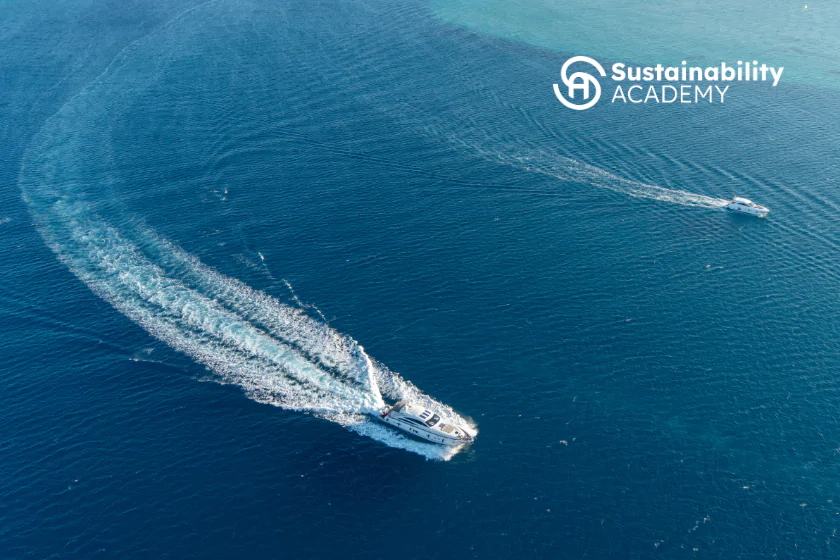Sustainable yachting is redefining luxury at sea. As climate goals tighten and environmental awareness grows, the yachting industry is transforming. Today’s owners, builders, and charter guests demand more than elegance—they want sustainability built into every detail. From solar-powered shipyards to zero-emission propulsion, the shift is underway, and it’s only accelerating.
Clients now expect more than opulence. They want to know that the yachts they enjoy are contributing to a cleaner planet. As Fraser Yachts highlights, sustainability is becoming a key decision factor in yacht chartering, construction, and management.
Shipyards Leading Sustainable Yachting 2025
One of the clearest signs of progress is in the shipyards. Leading builders are integrating renewable energy into their operations and improving energy efficiency on a large scale.
According to Riviera Maritime Media, Italian shipbuilding giant Fincantieri is installing 22,000 solar panels across five of its shipyards. This initiative will generate over 10 megawatts of solar power, reducing its reliance on the national grid by 11 GWh per year—roughly the annual electricity use of 4,000 homes. This is part of a broader strategy by Fincantieri to align with EU climate targets and lead sustainability efforts in maritime construction.
Other shipyards are making similar moves. Palumbo Shipyards, for example, are working toward becoming fully sustainable by 2030, investing in wind and solar energy across their Malta and Naples locations. As highlighted by Revolution Marine Group, leading shipyards are embracing eco-conscious upgrades—from installing solar panels and hybrid systems to adopting energy-efficient onboard technologies that lower emissions and reduce environmental impact.
Sailing Ahead with Cleaner Propulsion
The shift toward sustainability is also evident in propulsion technology. Traditional diesel engines are being replaced—or at least supplemented—by greener alternatives.
Hybrid propulsion systems, which combine diesel and electric power, are now widespread. They reduce fuel consumption, lower emissions, and create a quieter, smoother ride. In some yachts, solar panels are used to charge onboard batteries, helping further reduce fossil fuel use.
One of 2024’s most groundbreaking projects is Feadship’s Project 821, the first superyacht to launch with an operational fuel cell system on board. While not fully emission-free, the system enables quiet, low-emission operation at anchor, helping reduce reliance on diesel generators. According to Boat International, this hybrid setup reflects Feadship’s ambition to transition toward green methanol and cleaner energy sources in the near future—a significant milestone in sustainable yachting.
A New Kind of Crew: Green Roles on Board
As yachts go greener, so do crew roles. The emerging Green Steward/ess is tasked with reducing environmental impact onboard—especially by minimizing single-use plastics. Despite their known harm to oceans, these items remain common, as Environment America notes. Green Steward/esses introduce reusable alternatives, manage recycling, and help guests make eco-friendly choices.
This role is increasingly in demand as owners and charter companies align with environmental goals. According to the Global Green Skills Report 2024, the need for professionals with green skills in sectors like maritime and tourism is up 38% compared to two years ago.
Crew who understand ESG principles and sustainable operations will be at the forefront of the industry’s evolution.
Regulation and Responsibility: Meeting ESG Expectations
Yachting isn’t immune from regulation. The European Union’s climate legislation now includes maritime transport under its emissions reduction plan. As noted by ESG Today, the EU is progressing toward its 2030 climate targets, and yachting is expected to do its part.
This means yacht operators must report on emissions, reduce fuel consumption, and adopt green technologies. ESG transparency is no longer optional—it’s expected by clients, regulators, and investors alike.
Aligning with international sustainability frameworks not only avoids penalties but also creates market value. A sustainable yacht is now a more desirable yacht.
Why Training Makes the Difference
For professionals in the yachting world, this rapid transformation presents both a challenge and an opportunity. Without proper knowledge and credentials, keeping pace with regulations and technologies can be overwhelming.
That’s where professional training steps in.
The Sustainability Academy offers a globally accredited Online Certificate in Sustainability for Yachting Professionals. This course equips captains, managers, consultants, and crew with the practical skills needed to meet new industry expectations.
Topics covered include:
- ESG strategy for maritime operations
- EU and global environmental regulations
- Sustainable procurement and resource efficiency
- Case studies from green shipyards and superyachts
- Best practices for onboard sustainability
Whether you’re new to sustainability or looking to deepen your expertise, this training provides the tools to lead and adapt.
Final Thoughts
The yachting industry in 2025 is no longer defined solely by luxury—it’s defined by leadership. Those who embrace sustainable practices are not just complying with rules; they are setting the standard for what the future of yachting looks like.
From solar-powered shipyards to hydrogen-driven propulsion and environmentally conscious crew, the shift is underway. And it’s here to stay.
The professionals who are educated, proactive, and aligned with sustainability goals will be the ones steering this new course.

